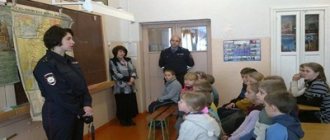According to the latest statistics, there is a decrease in the age threshold for committing primary crimes. To reduce the share of illegal acts by children, crime prevention is carried out by the authorized police department. A juvenile affairs inspector is a police officer who supervises children and adolescents who have come under close scrutiny after committing various offenses.
Juvenile Affairs Inspector.
Decoding PDN
The abbreviation PDN stands for “minor affairs unit.” It is a supervisory body whose employees are obliged to combat child crime, prevent the commission of unlawful acts and provide preventive education.
If a minor citizen turns out to be guilty of a violation, then information about this is transmitted to the military registration and enlistment office, the educational institution where he is studying, as well as to the university upon admission.
Inspectors carry out explanatory work, taking into account the psychology of each minor. Therefore, these positions are more often occupied by women, because they are better (in a motherly way) at winning over teenagers who have stumbled. When working with them, it is necessary to consistently present beliefs and strictly adhere to legal aspects.
Candidates for ODN employees must have a specialized education in law, but psychological and pedagogical education is always welcome. Such inspectors quickly find a common language with children and their parents.
General concepts
The duties of the PDN include many points, but its main task is to preventively explain responsibility for certain crimes. What is PDN? The decoding is as follows: this is the juvenile affairs unit. It is a supervisory body that is engaged in suppressing child crime and carrying out educational activities regarding what each unlawful violation entails. The PDN is part of the system of internal affairs bodies, therefore, in turn, it is divided into units that differ from each other in their level of subordination. They are:
- city, district and municipal;
- from the department of internal affairs and administrative-territorial formation;
- operating units on various types of vehicles.
All facts of violations of the law committed before the age of majority are entered into the child’s personal file with subsequent notification of military registration and enlistment offices, educational institutions, and higher educational institutions.
Important! A teenager must understand that an action that entails negative consequences for others will remind him of himself throughout his life.
The new order 845 on the juvenile affairs unit clearly defines the procedures and powers relating to the organizational work of the inspectorate. The main responsibilities of the unit are clearly written here. In addition to carrying out preventive work with teenagers, the inspector sends a difficult child who has committed a crime to temporary isolation centers or to special educational institutions with a closed type of work. The main thing is not to punish, but to find an approach to the child who has stumbled, so that a repeat violation does not occur.
The main task of inspectors is to provide preventive explanations of responsibility for certain crimes.
Main functions
The activities of the PDN are aimed at suppressing all types of crimes and identifying the circumstances that led to the commission of an unlawful act by a minor citizen. The inspector in his work is based on the following laws:
- No. 3-FZ dated 02/07/2011;
- No. 120-FZ dated June 24, 1999;
- Chapters No. 14, 20 of the Criminal Code of the Russian Federation;
- articles No. 73, 420, 421, 432 of the Code of Criminal Procedure of the Russian Federation;
- articles No. 183, 187-190 of the Penal Code of the Russian Federation;
- articles No. 5, 20 of the Code of Administrative Offenses of the Russian Federation.
In addition to the above regulations, the inspector additionally applies internal documents and instructions that prescribe the activities of each police unit.
Along with its supervisory functions, the ODN is authorized to deal with the legal protection of adolescents. If necessary, rehabilitation of juvenile offenders and their parents can be carried out.
The PDN inspector carries out preventive work with minors.
PDN inspectors carry out preventive work with minors who:
- use narcotic and psychotropic substances;
- broke the law;
- freed from criminal liability;
- are accused, but not taken into custody;
- have left specialized institutions and need help and rehabilitation;
- received a suspended sentence;
- carry out correctional work.
PDN inspectors must interact with parents who do not fulfill their direct upbringing responsibilities or who negatively influence their children. Employees of the juvenile affairs department are assisting in the search for teenagers who are wanted for committing a crime.
How to get a position
As mentioned above, to become an inspector you need a higher professional education and good health, not only physical, but also psychological.
Since the department experiences a shortage of employees every year, it is quite easy to get a position by meeting the requirements. To do this, you need to contact the city department of the service, if there are vacancies, undergo an interview, medical examination and provide documents.
When assigned to a site, the boss transfers to the new employee all the necessary information about the area, including logs of ongoing activities.
Inspectors' work
The legislation establishes the job responsibilities of ODN employees. In addition to working with citizens’ appeals, such an employee is engaged in:
- conducting preventive conversations with children and members of their families;
- clarification of articles of the Code of Administrative Offenses and the Criminal Code of the Russian Federation, according to which adults are held accountable for cruelty to minors and are deprived of parental rights;
- lecturing on tolerance and respect to high school students;
- issuing a referral to a psychologist or narcologist;
- removing children from dysfunctional families and placing them in orphanages;
- keeping records of teenagers who do not study or leave educational institutions without permission, drink alcohol, toxic substances, participate in fights, thefts, etc.
The minimum period of stay on preventive registration is 6 months. If after this period it is clear that the teenager has improved, then the registration is stopped.
Specialists are required to plan their activities taking into account working hours and the characteristics of the supervised area. They must collect information, analyze it and predict the possibility of committing crimes. Inspectors are required to respond to incoming calls and applications, check them and provide timely reports on the work done.
Registration of minors with the PDN, causes and consequences
The powers to work with children who have committed offenses or crimes are vested not only with the police, but also with the KDN and ZP - the commission for minors and the protection of their rights under the administration of the district or city of Nizhny Novgorod, which is directly involved in deciding the issue of placing a minor on probation. preventive accounting in PDN. This is a collegial body, which includes representatives of the administration, the guardianship and trusteeship authority, the police department, an assistant district prosecutor for the supervision of juvenile affairs, psychologists, school administrators, social workers. teachers, etc.
It is worth remembering that you can only get registered after repeated or serious violations!
A minor child may be sent to a commission in various cases. The basis for registering a teenager can be:
- When a child was observed using prohibited substances (narcotics, psychotropic drugs and alcohol);
- If a child has committed an offense that provides for administrative liability, but due to his age he cannot be held administratively liable;
- If the child has committed a socially dangerous act that is not subject to criminal liability due to not reaching the age at which criminal liability begins;
- In the case where a minor cannot be held criminally liable due to mental retardation or the presence of a mental illness;
- If a citizen under 18 years of age is released on parole due to a pardon or amnesty;
- If this person was convicted of committing a crime of minor or moderate gravity, but was released from the courtroom and from punishment, subject to compulsory educational measures;
- If the offender received a deferment of serving the sentence or a deferment of execution of the sentence;
- If a minor is given a suspended sentence, he is required to perform forced labor, but is not deprived of his freedom;
- If a child systematically leaves government institutions - a boarding school, an orphanage;
By the way, children can be controlled not only because of their misconduct, but also because of the actions of their parents (Article 5.35 of the Code of Administrative Offenses of the Russian Federation).
An identified fact or a statement with a request to conduct an investigation into whether a teenager has committed an offense or a crime is sent to the police department of the Russian Ministry of Internal Affairs in Nizhny Novgorod. The PDN inspector draws up a protocol, takes explanations from the teenager and his legal representative, explanations from the victim and witnesses, requests characteristics of the child’s place of study and residence, and, if necessary, conducts a forensic medical examination. Based on the facts of the inspection, the inspector of the ODN OP of the Ministry of Internal Affairs of Russia for Nizhny Novgorod issues a ruling on the refusal or on the initiation of a case for an administrative offense, or a resolution on the refusal or on the initiation of a criminal case.
The PDN inspector sends the determination or resolution to the commission on juvenile affairs and the protection of their rights to decide on placing the minor under interdepartmental control with the subsequent organization of individual preventive work with him (or refusing to register and issue a warning). After 10 days, the CDN must issue a decision. During the review of the inspection material submitted by the police, the parents or legal representative of the child are heard. Parents need to present positive characteristics from the school, from the section where the child is studying, as well as his certificates, gratitude, medals, individual achievements, talk about the child’s hobbies, etc. Then convince the commission members that the parents will definitely help the teenager improve, that the child is under control, preventive conversations are regularly held with him at home, that the offense was committed for the first time, that the child lives in a complete family, the parents are raising the child, attend parent-teacher meetings, the child is provided with rest and leisure, the parents ensure the correct physical and mental development of the child.
It is important that the decisions of the Control Committee are fair in most cases!
The commission puts the child on preventive registration only after repeated and serious socially dangerous acts in the absence of adult control over the child. In case of a single offense, the case will end with a preventive conversation with the minor and his parents. However, there are cases when parents do not agree with the decision of the Department of Children's Children to register their child for preventive registration in the Department of Children's Children's Services. In this case, you need to appeal the decision of the Control Committee in court. The law allows 10 days for this. But even if the court did not listen to the parents’ arguments and left the decision (resolution) of the commission on minors’ affairs in force, then after six months you can submit an application to remove the child from the preventive register. The application is written in free form, indicating the facts of the correction of the child, who no longer needs additional control from the PDN inspectors. If everything really works out for the teenager, then he is removed from the register completely. By the way, inspectors themselves may notice changes, which means removing the teenager from preventive registration without a parental statement. To do this, they only need to obtain the consent of the head of the police department. The following are automatically removed from the PDN register: persons who have reached the age of majority (18 years); upon expiration of the suspended sentence; when there is no longer any legal basis for such accounting.
When registering a minor for preventive registration, the ODN OP of the Ministry of Internal Affairs of Russia for Nizhny Novgorod is guided by Order No. 845 of the Ministry of Internal Affairs of the Russian Federation, clause 49.1.6 (those who have committed a socially dangerous act and are not subject to criminal liability due to not reaching the age at which criminal liability begins).
The decision of the KDN on registration for preventive registration is sent to the head of the OP of the Ministry of Internal Affairs of Russia for Nizhny Novgorod. If the head of the police department approved the resolution of the police department, then the conclusion on placing the minor on preventive registration with the police department and the establishment of a registration and preventive card is sent to the police department (a copy is sent to the police department). The registration card contains information about the child, his parents, his lifestyle, family composition, incoming information about his progress at school, clubs, etc., a plan for individual preventive work and a sheet for recording preventive measures for six months are drawn up. Then educational and preventive work is carried out with the teenager by a PDN inspector and a social teacher in an educational institution.
The main methods of legal influence on juvenile offenders are:
- constant supervision of the child’s behavior at school, on the street, in sections - the PDN inspector has the right to be interested in his achievements and characteristics, both in written and oral form.
— individual or joint raids with the Children’s Control Committee on the place of residence of “problem” children, clarifying the circumstances of conflict situations with parents and teachers, conducting conversations with both the child and adults. As well as sending information to the prosecutor’s office if there are grounds for deprivation or restriction of parental rights, drawing up appropriate documentation when revealing facts of parents’ failure to fulfill their responsibilities for raising children, etc.
— drawing up an inspection report on the living conditions for children at their place of residence to identify the provision of everything necessary for leisure, recreation and study.
Parents of teenagers need to be very attentive and careful - as a result of even any school fight or brawl, the injured party, represented by legal representatives, can present their claims to you, threatening to go to court. Moreover, if a minor has already been registered with the PDN once, then a repeated fight at the age of 16-18 years can result in a real sentence for him under Article 115 of the Criminal Code of the Russian Federation (intentional infliction of minor harm to health).
That is why you need to take care of protecting the rights of your children as soon as possible by resorting to qualified professional assistance from a lawyer in family and juvenile law. After all, it is much easier to prevent trouble than to analyze its consequences.
As you know, there are no ideal children. But the future fate of the child will largely depend on the family and environment in which the child is raised...
Employment requirements
Not every person will be able to work in a juvenile affairs unit due to many controversial issues and nuances. The following requirements apply to candidates for the position of inspector:
- availability of specialized education;
- Russian citizenship;
- possession of a military ID;
- no criminal record;
- absence of close relatives with a criminal record.
Filling a vacant position is difficult. The applicant must have a good understanding of the legal and social fields. The future PDN inspector must be able to approach children in an unconventional way, show flexibility, listen and hear every child.
The state gives good incentives for serving in the police. In addition to high wages, employees receive a bonus for length of service. They are provided with preferential treatment at a sanatorium, free uniforms and medical guarantees.
How to become an inspector?
Each inspector is assigned to a specific territory. The size of this territory is determined by the head of the department of the Ministry of Internal Affairs to which the inspector belongs. He is briefed on the state of affairs in the given territory.
According to the order of the Ministry of Internal Affairs No. 845, the following documents are required to apply for the position of PDN inspector:
- Citizenship of the Russian Federation;
- Military ID;
- Legal or pedagogical education;
- Medical examination;
- Relatives have no criminal record.
Interaction between the PDN and guardianship authorities
The PDN Commission works closely with employees of administrative and educational institutions that are located in the same area. Together they are developing a set of preventive measures and monitoring the pupils of specialized closed reception centers.
Police officers help guardianship officials cope with difficult children left without parents. Preventive and explanatory work is carried out with them.
ODN identifies organizers of youth groups who engage in antisocial activities and encourage other minors to commit the same actions. Inspectors identify unreliable persons who accustom minors to drugs or intoxicants. They take part in raids to suppress the drinking of alcoholic beverages by young people, and combat the spread of prohibited substances among teenagers.
Rights of juvenile investigators
ODN employees have the right to:
- invite teenagers and their parents/guardians to dialogue about the offense committed;
- visit disadvantaged families and conduct conversations with children and their legal representatives;
- send inquiries regarding minors to various institutions;
- deliver and detain offenders to the police station within 3 hours, conduct searches if necessary;
- register a child if he systematically acts illegally;
- control the activities of difficult teenagers in order to prevent aggravating acts;
- participate in the consideration of materials about the crime committed and antisocial activities of a minor.
Visiting disadvantaged families for the purpose of conducting preventive conversations.
The inspector may propose to the relevant body or institution to apply one or another measure of influence against the offender. The inspector’s powers also include the right to make proposals on how to eliminate the causes and conditions that contributed to the commission of the crime. The management of the institution or body must notify the PDN inspector of the measures taken within a month.
I APPROVED
JOB DESCRIPTION
PDN INSPECTOR ASSIGNED TO
EDUCATIONAL INSTITUTION.
1. General Provisions.
1. The juvenile affairs inspector assigned to the educational institution (hereinafter referred to as the “school inspector”) is a full-time employee of the PDN of the public security police in the region of Krasnoyarsk.
2. The assignment of an inspector for minors to an educational institution and his release from performing duties is carried out by order of the head of the relevant internal affairs body, which serves the territory on which the educational institution is located.
3. The staffing position of a school inspector is assigned to a secondary educational institution with at least 500 students, taking into account the operational situation on the territory of the municipality. If necessary (a consistently tense crime situation among students over several years), the school inspector position can be assigned to an educational institution with a smaller number of students.
The service area of the school inspector includes the educational institution and the surrounding area, as well as the place of residence of students.
4. The work plan and schedule of the school inspector is approved by the head of the internal affairs body or his deputy - the head of the public security police, in agreement with the head of the educational institution.
5. The school inspector is obliged:
5.1. Plan and carry out your activities taking into account the organization of the educational process in an educational institution.
5.2. Regularly, but at least once a quarter, report on the results of your work to the head of the police department of the internal affairs body, as well as the deputy chief - head of the public security police of the internal affairs body.
5.3. Wear uniforms of the established pattern when carrying out their activities in an educational institution.
5.4. Report to the head of the internal affairs body on the identification of students who have committed offenses, groups of minors and places of their concentration, persons involving minors in committing crimes and administrative offenses, or facilitating the commission of such offenses by minors, parents or legal representatives who maliciously fail to fulfill their duties in raising children and their antisocial behavior contributing to their commission of offenses, in order to take measures against them as provided for by the legislation of the Russian Federation.
2. Job responsibilities, forms and deadlines for their implementation.
№
p/p
3. Rights according to position.
The school inspector has the right:
3.1. Participate in the consideration by the commission on affairs of minors and the protection of their rights of materials and the application of measures of influence against students, their parents or legal representatives in cases and in the manner provided for by the legislation of the Russian Federation.
3.2. Participate in the development of an action plan for organizing the interaction of the educational institution with other bodies and institutions of the system for the prevention of neglect and juvenile delinquency.
3.3. Take part in meetings of the prevention council, board of trustees, pedagogical council, and other self-government bodies of the educational institution on issues within its competence.
3.4. Carry out, together with the administration of the educational institution, events (round tables, discussions, competitions, role-playing games, etc.) aimed at developing moral qualities, patriotic feelings, and a healthy lifestyle in students.
3.5. Provide organizational, methodological and legal assistance to the teaching staff in matters of preventing neglect and crime among students.
3.6. Summon students of an educational institution, their parents (legal representatives), and also visit them at their place of residence in order to find out their lifestyle, connections and intentions, obtain explanations from them, and carry out explanatory work with them on issues within his competence.
3.7. Receive, in the prescribed manner, from the administration of the educational institution the necessary information about the students of the educational institution.
3.8. Participate in the development and implementation of programs and methods aimed at developing law-abiding behavior in students.
3.9. Participate in organizing recreation and employment for students of an educational institution during the holiday period.
3.10. Make proposals to increase the effectiveness of individual preventive work with students of an educational institution, their parents (or legal representatives) to the head of the educational institution and the head of the department for minors of the internal affairs body.”
4. Interaction by position.
4.1. In the process of implementing the functions assigned to him, the PDN inspector interacts:
- with ESD detectives conducting preventive work with minors,
- local police commissioners for organizing work with juvenile offenders and parents who are not fulfilling their duties,
- investigators of the investigation department, investigators conducting investigations against minors,
- bodies and institutions of the system for the prevention of neglect and juvenile delinquency,
- medical and psychological centers, narcologists,
- territorial councils, parent committees, other public associations,
- other interested departments.
| Job responsibilities | Forms of implementation | Frequency of execution | |
| 2.1. | Participates in activities to prevent neglect and homelessness, alcohol consumption, drug addiction and substance abuse among students. | — Together with teachers, identifying dysfunctional families, working with them to eliminate the causes and conditions of neglect and homelessness. — Individual conversations, lectures, visits students at their place of residence, raids on places where minors are concentrated. — Interaction with drug treatment services. - Promotion of healthy lifestyles. | Constantly |
| 2.2. | Conducts individual preventive work with students registered in an educational institution or in the PDN, KDNiZP, and parents or other legal representatives of these students, takes measures to ensure the rights and legitimate interests of minors. | — Conversations on legal topics, visits to places of residence, assistance in organizing summer holidays and leisure activities. — Information and submissions to the CDNiZP to protect the legal rights and interests of minors, as well as to take measures against minors, their parents and legal representatives. | Constantly |
| 2.3. | Implements measures to prevent and suppress offenses and antisocial actions, including those of an extremist nature, on the part of students of an educational institution or in relation to them. | — Finds out information about the lifestyle and connections of juvenile offenders available to teachers, police officers, information coming from the population, other interested institutions and organizations. — Analyzes publications in the media. — Conducts legal propaganda. | Constantly |
| 2.4. | Participates in ensuring public order and public safety in the service area. | Protecting public order during mass events. | As necessity |
| 2.5 | Conducts legal propaganda among students and their parents or other legal representatives, work to develop law-abiding behavior and a sense of tolerance among students of their peers of other nationalities and religious denominations. | — Lectures, conversations, round tables, quizzes, debates, speeches at parent-teacher meetings. — Interaction with a psychologist (testing students). | Constantly |
| 2.6 | Carries out proceedings in cases of administrative offenses in accordance with the legislation of the Russian Federation on administrative offenses. | — Prepares materials on administrative offenses committed by and against minors and submits them for consideration to the relevant authorities. | Constantly |
| 2.7 | Identifies the causes and conditions that contribute to the neglect and homelessness of minors, the commission of offenses and antisocial acts by students | — Work on early prevention of crime by students. — Interaction with interested departments, organizations and institutions of the system for the prevention of neglect and juvenile delinquency. | Constantly |
| 2.8 | Prepares materials necessary for the court to consider the issue of the possibility of placing students in a special closed educational institution. | — Collects the necessary materials, assists in passing a medical commission, makes a submission to the court to send the student to a special closed educational institution. | As needed |
| 2.9 | Prepares materials on the placement of students in a temporary detention center for juvenile offenders of the internal affairs body in cases provided for in Article 22 of the Federal Law “On the Fundamentals of the System for the Prevention of Neglect and Juvenile Delinquency” | — Collects characterizing material, prepares a petition to the court. | As needed |
| 2.10 | Interacts, within its competence, with bodies and institutions of the system for the prevention of neglect and juvenile delinquency on the organization of individual preventive work with minors and their parents or legal representatives. | — Carrying out joint activities with interested departments, organizations and institutions of the system for the prevention of neglect and juvenile delinquency, exchange of information. | Constantly |
| 2.11 | Works to identify: | ||
| 2.11.1 | Students of an educational institution who are in a socially dangerous situation, including those who commit offenses, systematically use alcoholic beverages, narcotic drugs, psychotropic and intoxicating substances, as well as commit other antisocial actions. | — During preventive measures, in conversations with teaching staff, students and parents, when working with statements and messages from citizens. | Constantly |
| 2.11.2 | Minors who do not attend or systematically miss classes at an educational institution for unexcused reasons, establish their location, including through work in the residential sector. | — Collaboration with teachers, social educators, and students. Checks at the place of residence of students who systematically miss classes. | Constantly |
| 2.11.3 | Students who consider themselves to be members of illegal youth associations, establishing their connections, gathering places. Take measures to reorient and separate antisocial groups of minors, suppress the facts of negative influence on students from group members | — Establishes trusting relationships with citizens, verifies information obtained during confidential conversations, studies the operational situation in the serviced territory. — Together with the ESD, it takes measures to separate illegal groups. | Constantly |
| 2.11.4 | Parents or legal representatives of students who do not fulfill their responsibilities for the maintenance, education, training, protection of the rights and interests of minors who abuse them. | — Interaction with teachers, psychologists, health workers. — Individual conversations with children, parents, neighbors. — Work with applications and messages from citizens. | Constantly |
| 2.11.5 | Persons involving minors in committing offenses or antisocial acts, or committing other illegal acts against them in order to take corrective action in the manner prescribed by the legislation of the Russian Federation. | — Establishing trusting relationships. — Preventive work with minors registered with the ODN. — Checks at the place of residence. — Raids on concentration areas. | Constantly |
| 2.11.6 | Places of possible sale, purchase and consumption of narcotic drugs in the educational institution and in the surrounding area. | — Establishing trusting relationships. — Cooperation with school security. | Constantly |
| 2.12 | Participates in the organization and conduct of preventive raids, operations and other preventive measures aimed at identifying and providing assistance to minors and families in a socially dangerous situation. | — Organizes raids on dysfunctional families with the participation of teachers and members of the public. — Sends information about minors and families who find themselves in a socially dangerous situation to the KDNiZP, social protection authorities, | Constantly |
Is the traffic police inspector always right?
Although police officers from the juvenile department are representatives of law enforcement agencies, their actions may raise doubts about their legality.
Example No. 1. Orlov’s classmates were outraged by the way he behaved. They gathered in the classroom and talked to him. After school, Orlov told his parents about the educational conversation he had had. The next day they visited the school and interviewed the children in the presence of the teacher. The students' answers were recorded in a notebook. A few days later, the PDN inspector came and interrogated Orlov’s classmates, at which the class teacher was present. The students reported to their parents about the policeman’s actions, and they wrote a complaint to the law enforcement agency.
In accordance with Art. 425 of the Code of Criminal Procedure of the Russian Federation, if a minor is being interrogated, then a teacher or psychologist must be present. The prosecutor's office did not see any violations on the part of the PDN inspector and recognized his actions as legal.
Example No. 2. The mother of a 12-year-old girl was invited to a child care center. She asked her daughter about the reasons for the call and found out that she and her friend had not paid for a package of chips, taking them and running away. Mom doubts how to do the right thing, whether to admit to the offense or deny committing it.
First, she should find out exactly why the inspector wanted to talk to her, since the conversation could be about something completely different. In addition, non-payment for goods implies only administrative liability. The girl is only 12 years old, and persons over 14 years of age are subject to punishment. The best option in such a situation is to admit to the offense and listen to a preventive conversation.
Example No. 3. At city holiday events, minor Petrov was walking in the company of his friends. As they were leaving the park area, a traffic police inspector approached the group. She saw one young man holding a can of beer and accused everyone of drinking alcohol. The inspector sent them all to the hospital for examination. In the company, only Petrov was under 18 years old. The ODN officer did not have the right to refer Petrov to the procedure without first obtaining the consent of his parents. They challenged the inspector's unauthorized actions.
How does PDN differ from KDN?
Important: it is necessary to distinguish between the CDN (commission on juvenile affairs) and the PDN. It seems that their final goal and names are similar, but these are completely different structures .
The commission is a collegial body, consisting of several members under the leadership of a chairman. Members of the KDN can be representatives of government agencies, public associations, religious denominations, or simply socially active citizens with experience working with children.
The commission system has a hierarchical structure: Government Commission → Commission Committee of a constituent entity of the Russian Federation → Municipal Commission Committee.
The main goal of such commissions is to protect the rights and interests of minors from discrimination, any form of violence, and exploitation.
PDN is one of the structures of the Department of Internal Affairs. The role of this unit is supervision, control, and prevention. The purpose of the PDN is to suppress offenses committed by minors and carry out preventive work. Previously (under the USSR), these functions were performed by police children's rooms .
The procedure for appealing the actions of a traffic police inspector
Sample application for actions of a traffic police inspector.
In case of unsatisfactory performance of a police officer, a complaint must be submitted to his immediate supervisor. The next authority is the prosecutor's office. Also, within 10 days from the date of drawing up the protocol, you can send a complaint to the court.
There are situations when the PDN inspector did not react to the application received and did not do anything. For example, the mother of a schoolboy called him and complained that her son was receiving threats of beating.
Before filing a complaint, a woman needs to make sure that her complaint is registered with the police. If the case was accepted for proceedings, but the inspector did nothing, then you need to go to the prosecutor’s office or the immediate superior of the police officer.
How to file cases against minor children
When a complaint about a juvenile offense is received, the inspectorate employee acts as follows:
- Creates an account card or file.
- Listens to the victim and suspect.
- Collects materials on the crime committed.
- Draws up a report on the violator’s living conditions.
- Requests information about the work carried out with the minor and his parents.
- Files characteristics, information about the teenager’s hobbies and ways of spending leisure time.
- Prepares a report on the inspection performed.
An employee of a child care institution, a victim, a parent of an injured child, or an employee of a government organization have the right to initiate the registration of a minor. But only a special commission can finally decide on the need for accounting.







